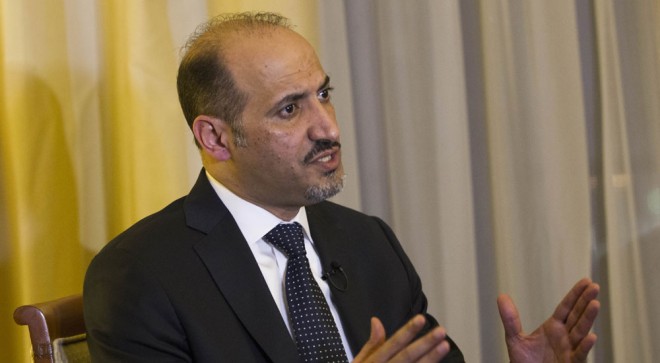Syria says to attend Geneva but won’t hand over power

President of the Syrian National Coalition Ahmad al-Jarba speaks during an interview at a hotel in Cairo’s Zamalek district, Egypt, Wednesday, Nov. 27, 2013. Al-Jarba told The Associated Press that it is ready to attend the Geneva conference scheduled for Jan. 22. Al-Jarba reiterated the coalition’s stance that it sees the conference as leading to a transitional government. The Syrian opposition and its Western supporters insist that President Assad, who will also send a delegation, cannot be part of such a government. AP
DAMASCUS – Syria will send delegates to a Geneva peace conference under President Bashar al-Assad’s orders, but his grip over the war-torn country will not be under discussion, an official said Wednesday.
The announcement was immediately condemned by Syria’s opposition, which restated its demand that the talks, dubbed Geneva 2, must lead to a political transition that excludes any role for Assad.
Despite the dim prospects for peace with both sides refusing to compromise, Iran said it and Turkey, which support opposing sides in the war, would press for a ceasefire ahead of the talks.
The January 22 peace conference is aimed at ending the nearly three-year-old civil war, a bloody stalemate which has killed an estimated 120,000 people and driven millions from their homes.
“Syria announces the participation of an official delegation under the orders of (Assad) and the demands of the Syrian people, with the top priority eliminating terrorism,” said a foreign ministry source quoted by state media.
Article continues after this advertisementThe source also said the delegation was not going to Geneva to hand over power, and that the condition stipulated by Syria’s opposition and the West that Assad must not have a role in the country’s future was out of the question.
Article continues after this advertisement“Our people will not allow anyone to steal their right to choose their future and their leaders, and what is key about Geneva is to assert the Syrians’ rights, and not of those who are spilling the people’s blood.”
The main opposition National Coalition dismissed the announcement as “a pretence of cooperation with the international community as a cover to continue its war on the Syrian people.”
The Coalition reiterated its demand that Geneva 2 must lead to the creation of a “transitional governing body” with “full executive powers” that excludes Assad “and those associated with him.”
Iran, Turkey call for ceasefire
Iran, the Assad regime’s most powerful regional backer, said that both it and Turkey, which supports the opposition, would press for a ceasefire in Syria ahead of the planned peace talks.
“All our efforts should be carried out to finish the conflict and reach a ceasefire even before Geneva 2,” Foreign Minister Mohammad Javad Zarif said at a news conference in Tehran with his Turkish counterpart Ahmet Davutoglu.
Ceasefires have been announced before, notably around Muslim holidays, but none has ever held up despite pledges of commitment by both sides.
While the opposition Coalition enjoys Western support, it is unclear how much control it has over the hundreds of rebel groups fighting on the ground.
A newly formed rebel alliance said Tuesday it wants to replace Syria’s regime with an Islamic state.
In its charter, the Islamic Front also said the only way to bring about its objective to bring down Assad was through “military rebellion.”
Syria’s mainstream rebel leader said that all those fighting Assad’s regime are Muslims but that the draconian punishments imposed by jihadist groups in Islam’s name are “alien.”
Supreme Military Council leader Selim Idriss pledged cooperation, however, with the Islamic Front just days after it committed itself to setting up an Islamic state, in an interview with the Dubai-based Al-Aan news channel to be broadcast on Thursday.
Nikolaos Van Dam, an expert on Syria, said Geneva 2 could be “a first step towards reaching an armistice,” but warned the prospects for ending the war would be “bleak” if the regime and rebels continued clashing on the battlefield during the conference.
“The opposition wants to negotiate on condition that they get an advance commitment that they achieve the aim they would be negotiating for,” Van Dam said in an email to AFP.
But he added Assad was “not going to negotiate about his own removal from power, (certainly not as long as he is the stronger party). You cannot expect him to sign his own death warrant.”
On the ground, fighting raged on a number of fronts, including east of Damascus, where rebels launched a major offensive aimed at breaking a year-long, suffocating army siege on opposition-held areas.
The army hit back pounding several flashpoints of the Eastern Ghouta area, killing at least three men, said the Syrian Observatory for Human Rights.
Meanwhile at least 10 mortar rounds hit the majority Christian-Druze district of Jaramana in southeastern Damascus, killing one woman, the Observatory added.